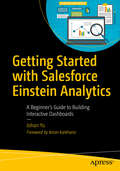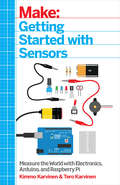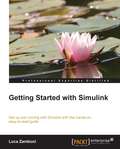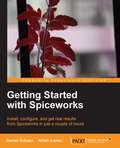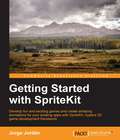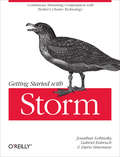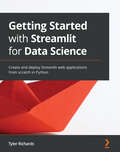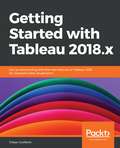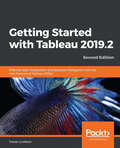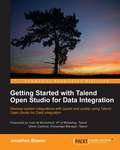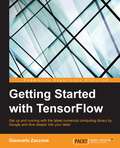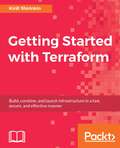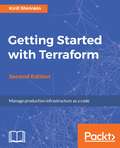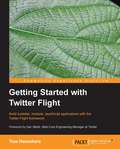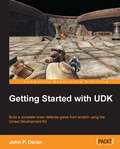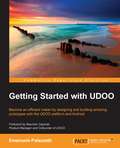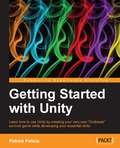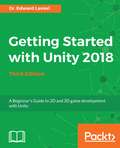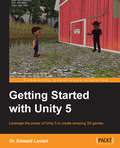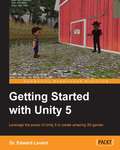- Table View
- List View
Getting Started with Salesforce Einstein Analytics: A Beginner’s Guide to Building Interactive Dashboards
by Johan YuBuild interactive dashboards using Salesforce Einstein analytics. Explore all of your data quickly and easily by providing AI-powered advanced analytics, right in Salesforce. You will manage datasets, query data with Salesforce Analytics Query Language (SAQL), and customize dashboards.Because Einstein Analytics is new, the curve to learn this technology can be difficult. This book guides you step-by-step in simple, easy-to-understand terms to get data from the Salesforce platform to the Einstein Analytics platform and also shows you how to import external data (e.g., CSV files). Core chapters focus on understanding data sources, dataflow, dataset, and lens leading up to building dashboards from scratch. Advanced features such as data transformation using computeExpression and computeRelative as well as dataflow with a multi-value lookup are explored. What You Will Learn Use data from Salesforce and external sourcesCreate a dataflow to build a flexible datasetBuild dashboards using Einstein AnalyticsExplore and analyze data using Einstein AnalyticsUtilize SAQL and binding to create advance dashboards Who This Book Is For IT users getting started with Einstein Analytics, Salesforce consultants starting new Einstein Analytics projects, and power users familiar with Salesforce reporting and dashboards who want to get up to speed on new analytics features
Getting Started with Secure Embedded Systems: Developing IoT Systems for micro:bit and Raspberry Pi Pico Using Rust and Tock
by Ioana Culic Alexandru RadoviciBuild secure and reliable IoT applications for micro:bit and Raspberry Pi Pico by using Rust and Tock. One of the first Operating Systems written in Rust, Tock is designed to safely run multiple applications on low power devices, enabling you to build a secure foundation for IoT systems. It is an open-source OS that has recently gained popularity as companies such as Google[1] explore and integrate it into their products. This book guides you through the steps necessary to customize and integrate Tock into your devices. First, you'll explore the characteristics of Tock and how to run it on two of the most popular IoT platforms: micro:bit and Raspberry Pi Pico. You’ll also take a look at Rust and how to use it for building secure applications with Tock. The book focuses on the Tock kernel internals and presents the steps necessary to integrate new features. From simple drivers to the more complex asynchronous ones, you are provided with a detailed description of the Tock kernel API. Next, you'll review the Tock applications framework for C. Starting from simple Tock APIs to the more complex Inter-Process Communication system, this book provides a complete overview of the Tock application ecosystem. By taking a practical approach, Getting Started with Secure Embedded Systems provides a starting point for building a secure IoT foundation using the Tock Operating System. You will: Use Rust for embedded systems development Write applications and drivers for Tock Customize the Tock kernel for specific hardware platforms Set a solid base for building secure and reliable IoT applications Use Tock to ensure the security of your microcontrollers and integrate them into your projects Manage products that rely on Tock Who This Book Is For IoT system designers, developers, and integrators who are familiar with operating systems concepts. The book can also be suitable for people with less experience, who want to gain an overview of the latest hardware and software technologies related to building secure IoT systems.
Getting Started with Sensors: Measure the World with Electronics, Arduino, and Raspberry Pi
by Tero Karvinen Kimmo KarvinenTo build electronic projects that can sense the physical world, you need to build circuits based around sensors: electronic components that react to physical phenomena by sending an electrical signal. Even with only basic electronic components, you can build useful and educational sensor projects.But if you incorporate Arduino or Raspberry Pi into your project, you can build much more sophisticated projects that can react in interesting ways and even connect to the Internet. This book starts by teaching you the basic electronic circuits to read and react to a sensor. It then goes on to show how to use Arduino to develop sensor systems, and wraps up by teaching you how to build sensor projects with the Linux-powered Raspberry Pi.
Getting Started with Simulink
by Luca ZamboniThis practical and easy-to-understand learning tutorial is one big exciting exercise for students and engineers that are always short on their schedules and want to regain some lost time with the help of Simulink.This book is aimed at students and engineers who need a quick start with Simulink. Though it's not required in order to understand how Simulink works, knowledge of physics will help the reader to understand the exercises described.
Getting Started with SketchUp Pro: Embark on your 3D modeling adventure with expert tips, tricks, and best practices
by David S. SellersLevel up your 3D design skills with SketchUp Pro by employing real-world examples and design guidelinesPurchase of the print or Kindle book includes a free PDF eBookKey FeaturesPut your architectural design knowledge to work by exploring practical examplesGain a deeper understanding of SketchUp's GUI, modeling tools, and editing featuresExecute full design creations with detailed steps without getting overwhelmed by SketchUp's advanced functionalitiesBook DescriptionOwing to its ability to create models quickly and with high level of dimensional accuracy, SketchUp Pro has become a popular choice for many industries, including architecture, interior design, landscape architecture, and video game design. If you are seeking to adopt Trimble's exceptional design software, Getting Started with SketchUp Pro serves as an ideal primer to prepare and equip you for its use. This book will help you lay the foundation of a project from scratch, set up appropriate units, and follow a guided path to structure your 3D models. You'll explore the workflows used for creating designs from sketches, making CAD drawings (DWG), and even updating your existing 3D models. Finally, you'll work with extensions and 3D Warehouse to find new workflows and models to add to your skill set. By the end of this SketchUp book, you'll be able to confidently create and share models of your design through CAD drawings and 3D views, and even take them online through the 3D WarehouseWhat you will learnBuild massing 3D models and preliminary designsIdentify optimal methods to boost productivity and efficiency with SketchUp ProExplore SketchUp tools and understand their diverse functionalityGet a complete walkthrough of editing tools, materials, and components in SketchUpCreate and edit components and explore component optionsGet acquainted with SketchUp extensions, 3D Warehouse, and additional tools and resourcesWho this book is forThis book is for architects, landscape architects, interior designers, woodworkers, and 3D modelers with beginner-level knowledge of the architectural design of living spaces. Basic computer skills are all you need to get started.
Getting Started with Soldering: A Hands-On Guide to Making Electrical and Mechanical Connections
by Marc De VinckGetting Started with Soldering not only teaches new makers and experimenters the core principles of soldering, it also functions as an excellent reference and resource for beginners and more advanced makers alike. The book guides readers through the fundamentals of soldering, explains the tools and materials, demonstrates proper techniques, and shows how to fix mistakes or broken connections. It even includes guidance on more advanced techniques such as surface-mount soldering for electronics. From choosing the right soldering iron to making perfect connections, readers will acquire the knowledge and skills needed to form a strong foundation for a lifetime of making.Soldering is a core concept in making, electronics prototyping, and home repairsThe many different types of soldering -- requiring different materials and tools -- are explained with easy-to-follow instructionsFull-color photographs and illustrations throughout create a visually engaging format for learningPricing and technical considerations help readers select the best tools for their budgets and needsTroubleshooting guidelines show how to repair solder connections that have failed from improper technique or from age
Getting Started with Spiceworks
by Darren Schoen Nitish KumarThis book will have a getting started approach, thus making it easy for the readers to understand and learn Spiceworks.This book is for any IT pro who wants to make their day easier. With this book, you can go from installing Spiceworks to having a good working knowledge of it in a single afternoon, no Spiceworks experience required! This book assumes no prior experience with Spiceworks. Knowledge of Linux System administration is expected.
Getting Started with SpriteKit
by Jorge JordanDevelop fun and exciting games and create amazing animations for your existing apps with SpriteKit, Apple's 2D game development framework About This Book * Learn the key concepts of game development in iOS * Take advantage of SpriteKit to create your own games and improve your apps * Follow the step-by-step chapters to create a complete product ready to submit to the App Store Who This Book Is For Getting Started with SpriteKit is for beginner-level iOS developers who want to add an extra edge to their apps and create amazing games using SpriteKit. It doesn't matter whether you have experience in iOS development or not as this book will show you the swift tricks you can use to create games. What You Will Learn * Create and configure a SpriteKit project from scratch * Load and manage the basic elements of games such as sprites, labels, and geometrical primitives * Handle touch events, detect collisions, and play sound audio files * Create complex elements, animate sprites, and run the parallax effect * Complete your games with key components such as a main menu, transitions between scenes, a tutorial, and the ability to load and save data * Increase the efficiency of your device using the accelerometer or by adding shaders, lights, and shadows * Gain complementary techniques such as creating or finding audio resources, applying SpriteKit to apps, or using third-party tools In Detail SpriteKit is Apple's game engine to develop native iOS games. Strongly boosted by the Apple Inc., Cupertino, it has increased in popularity since its first release. This book shows you the solutions provided by SpriteKit to help you create any 2D game you can imagine and apply them to create animations that will highlight your existing apps. This book will give you the knowledge you need to apply SpriteKit to your existing apps or create your own games from scratch. Throughout the book, you will develop a complete game. The beautiful designs implemented in the game in this book will easily lead you to learn the basis of 2D game development, including creating and moving sprites, and adding them to a game scene. You will also discover how to apply advanced techniques such as collision detection, action execution, playing music, or running animations to give a more professional aspect to the game. You will finish your first game by learning how to add a main menu and a tutorial, as well as saving and loading data from and to the player's device. Finally, you will find out how to apply some mobile games techniques such as accelerometer use or touch detection. Style and approach Written in an informal way with plenty of illustrative screenshots, this easy-to-follow and practical guide will help you get the most from SpriteKit. The main part of the book provides step-by-step instructions to develop of a complete product, while the last chapters give you some complementary techniques than can be used in mobile 2D game development.
Getting Started with Storm
by Jonathan Leibiusky Gabriel Eisbruch Dario Simonassi<p>Even as data is turning the world upside down, the next revolution is taking shape: realtime data analysis. Data tools like Hadoop are batch-oriented; they're good at taking a set of data, analyzing it, and giving you the result later. But these tools are not particularly good at handling streaming data: data that is constantly arriving, and results that are changing as fast as the data arrives. Storm is a new tool that solves that problem. This book gets you started with it.</p>
Getting Started with Storm: Continuous Streaming Computation with Twitter's Cluster Technology
by Jonathan Leibiusky Gabriel Eisbruch Dario SimonassiEven as big data is turning the world upside down, the next phase of the revolution is already taking shape: real-time data analysis. This hands-on guide introduces you to Storm, a distributed, JVM-based system for processing streaming data. Through simple tutorials, sample Java code, and a complete real-world scenario, you’ll learn how to build fast, fault-tolerant solutions that process results as soon as the data arrives.Discover how easy it is to set up Storm clusters for solving various problems, including continuous data computation, distributed remote procedure calls, and data stream processing.Learn how to program Storm components: spouts for data input and bolts for data transformationDiscover how data is exchanged between spouts and bolts in a Storm topologyMake spouts fault-tolerant with several commonly used design strategiesExplore bolts—their life cycle, strategies for design, and ways to implement themScale your solution by defining each component’s level of parallelismStudy a real-time web analytics system built with Node.js, a Redis server, and a Storm topologyWrite spouts and bolts with non-JVM languages such as Python, Ruby, and Javascript
Getting Started with Streamlit for Data Science: Create and deploy Streamlit web applications from scratch in Python
by Tyler RichardsCreate, deploy, and test your Python applications, analyses, and models with ease using StreamlitKey FeaturesLearn how to showcase machine learning models in a Streamlit application effectively and efficientlyBecome an expert Streamlit creator by getting hands-on with complex application creationDiscover how Streamlit enables you to create and deploy apps effortlesslyBook DescriptionStreamlit shortens the development time for the creation of data-focused web applications, allowing data scientists to create web app prototypes using Python in hours instead of days. Getting Started with Streamlit for Data Science takes a hands-on approach to helping you learn the tips and tricks that will have you up and running with Streamlit in no time. You'll start with the fundamentals of Streamlit by creating a basic app and gradually build on the foundation by producing high-quality graphics with data visualization and testing machine learning models. As you advance through the chapters, you'll walk through practical examples of both personal data projects and work-related data-focused web applications, and get to grips with more challenging topics such as using Streamlit Components, beautifying your apps, and quick deployment of your new apps. By the end of this book, you'll be able to create dynamic web apps in Streamlit quickly and effortlessly using the power of Python.What you will learnSet up your first development environment and create a basic Streamlit app from scratchExplore methods for uploading, downloading, and manipulating data in Streamlit appsCreate dynamic visualizations in Streamlit using built-in and imported Python librariesDiscover strategies for creating and deploying machine learning models in StreamlitUse Streamlit sharing for one-click deploymentBeautify Streamlit apps using themes, Streamlit Components, and Streamlit sidebarImplement best practices for prototyping your data science work with StreamlitWho this book is forThis book is for data scientists and machine learning enthusiasts who want to create web apps using Streamlit. Whether you're a junior data scientist looking to deploy your first machine learning project in Python to improve your resume or a senior data scientist who wants to use Streamlit to make convincing and dynamic data analyses, this book will help you get there! Prior knowledge of Python programming will assist with understanding the concepts covered.
Getting Started with Tableau 2018.x: Get up and running with the new features of Tableau 2018 for impactful data visualization
by Tristan GuillevinLeverage the power of Tableau to get actionable business insights and make better business decisionsKey FeaturesExplore all the new features of Tableau 2018.xBegin your Tableau journey by understanding its core functionalitiesApply advanced techniques such as data blending and parameters to make the best of TableauBook DescriptionTableau is one of the leading business intelligence tools used worldwide, in organizations of every scale. In its latest release, Tableau 2018 promises richer and more useful features related to visual analytics, reporting, dashboarding, and a host of other data visualization aspects. Getting Started with Tableau 2018.x will get you up and running with these features.The book starts with all the new functionalities of the different Tableau 2018 versions, along with concrete examples of how to use them. However, if you're new to Tableau, don't worry! The rest of the book will guide you through each major aspect of Tableau with examples. You'll learn how to connect to data, build a data source, visualize your data, build a dashboard, and share it online. In the final chapters, you'll also learn advanced techniques such as creating a cross-database join, data blending, and more.By the end of the book, you will have a firm understanding of how to effectively use Tableau to create quick, cost-effective, and business-efficient business intelligence solutions.What you will learnDiscover new functionalities such as density, extensions, and transparency introduced in Tableau 2018.xConnect tables and make transformations such as pivoting the field and splitting columnsBuild an efficient data source for your analysisDesign insightful data visualization using different mark types and propertiesBuild powerful dashboards and stories Share your work and interact with Tableau ServerUse Tableau to explore your data and find new insightsExplore Tableau's advanced features and gear up for upcoming challengesWho this book is forIf you’re a beginner or an existing BI professional looking to get the most out of Tableau 2018's latest features, this book is for you. You’ll also find this book useful if you’re an aspiring analyst who wants to learn the capabilities of Tableau to answer business-specific questions. No prior knowledge or experience with Tableau or any other Business Intelligence tool is necessary.
Getting Started with Tableau 2019.2: Effective data visualization and business intelligence with the new features of Tableau 2019.2, 2nd Edition
by Tristan GuillevinLeverage the power of Tableau 2019.1’s new features to create impactful data visualizationKey FeaturesGet up and running with the newly released features of Tableau 2019.1Create enterprise-grade dashboard and reports to communicate your insights effectivelyBegin your Tableau journey by understanding its core functionalitiesBook DescriptionTableau is one of the leading data visualization tools and is regularly updated with new functionalities and features. The latest release, Tableau 2019.1, promises new and advanced features related to visual analytics, reporting, dashboarding, and a host of other data visualization aspects. Getting Started with Tableau 2019.1 will get you up to speed with these additional functionalities.The book starts by highlighting the new functionalities of Tableau 2019.1, providing concrete examples of how to use them. However, if you're new to Tableau, don’t worry – you’ll be guided through the major aspects of Tableau with relevant examples. You'll learn how to connect to data, build a data source, visualize your data, build a dashboard, and even share data online. In the concluding chapters, you'll delve into advanced techniques such as creating a cross-database join and data blending.By the end of this book, you will be able to use Tableau effectively to create quick, cost-effective, and business-efficient Business Intelligence (BI) solutions.What you will learnDiscover new functionalities such as ‘Ask Data’, the new way to interact with your data using natural languageConnect tables and make transformations such as pivoting the field and splitting columnsBuild an efficient data source for analysisDesign insightful data visualization using different mark types and propertiesDevelop powerful dashboards and stories Share your work and interact with Tableau ServerUse Tableau to explore your data and find new insightsExplore Tableau's advanced features and gear up for upcoming challengesWho this book is forExisting Tableau users and BI professionals who want to get up to speed with what's new in Tableau 2019 will find this beginner-level book to be a very useful resource. Some experience of Tableau is assumed, however, the book also features introductory concepts, which even beginners can take advantage of.
Getting Started with Talend Open Studio for Data Integration
by Jonathan BowenGetting Started with Talend Open Studio for Data Integration takes a step-by-step, hands-on approach to learning with lots of examples and clear instructions. Are you a developer, business analyst, project manager, business intelligence specialist, system architect or a consultant who needs to undertake integration projects, then this book is for you. The book assumes a certain level of familiarity with Relational database management systems with SQL and experience and Java.
Getting Started with TensorFlow
by Giancarlo ZacconeGet up and running with the latest numerical computing library by Google and dive deeper into your data! About This Book * Get the first book on the market that shows you the key aspects TensorFlow, how it works, and how to use it for the second generation of machine learning * Want to perform faster and more accurate computations in the field of data science? This book will acquaint you with an all-new refreshing library--TensorFlow! * Dive into the next generation of numerical computing and get the most out of your data with this quick guide Who This Book Is For This book is dedicated to all the machine learning and deep learning enthusiasts, data scientists, researchers, and even students who want to perform more accurate, fast machine learning operations with TensorFlow. Those with basic knowledge of programming (Python and C/C++) and math concepts who want to be introduced to the topics of machine learning will find this book useful. What You Will Learn * Install and adopt TensorFlow in your Python environment to solve mathematical problems * Get to know the basic machine and deep learning concepts * Train and test neural networks to fit your data model * Make predictions using regression algorithms * Analyze your data with a clustering procedure * Develop algorithms for clustering and data classification * Use GPU computing to analyze big data In Detail Google's TensorFlow engine, after much fanfare, has evolved in to a robust, user-friendly, and customizable, application-grade software library of machine learning (ML) code for numerical computation and neural networks. This book takes you through the practical software implementation of various machine learning techniques with TensorFlow. In the first few chapters, you'll gain familiarity with the framework and perform the mathematical operations required for data analysis. As you progress further, you'll learn to implement various machine learning techniques such as classification, clustering, neural networks, and deep learning through practical examples. By the end of this book, you'll have gained hands-on experience of using TensorFlow and building classification, image recognition systems, language processing, and information retrieving systems for your application. Style and approach Get quickly up and running with TensorFlow using this fast-paced guide. You will get to know everything that can be done with TensorFlow and we'll show you how to implement it in your environment. The examples in the book are from the core of the computation industry--something you can connect to and will find familiar.
Getting Started with Terraform
by Kirill ShirinkinBuild, combine, and launch infrastructure in a fast, secure, and effective manner About This Book • An up-to-date and comprehensive resource on Terraform that lets you quickly and efficiently launch your infrastructure • Learn how to implement your infrastructure as code and make secure, effective changes to your infrastructure • Learn to build multi-cloud fault-tolerant systems and simplify the management and orchestration of even the largest scale and most complex cloud infrastructures Who This Book Is For This book is for developers and operators who already have some exposure to working with infrastructure but want to improve their workflow and introduce infrastructure as a code practice. Knowledge of essential Amazon Web Services components (EC2, VPC, IAM) would help contextualize the examples provided. Basic understanding of Jenkins and Shell scripts will be helpful for the chapters on the production usage of Terraform. What You Will Learn • Understand what Infrastructure as Code (IaC) means and why it matters • Install, configure, and deploy Terraform • Take full control of your infrastructure in the form of code • Manage complete complete infrastructure, starting with a single server and scaling beyond any limits • Discover a great set of production-ready practices to manage infrastructure • Set up CI/CD pipelines to test and deliver Terraform stacks • Construct templates to simplify more complex provisioning tasks In Detail Terraform is a tool used to efficiently build, configure, and improve production infrastructure. It can manage existing infrastructure as well as create custom in-house solutions. This book shows you when and how to implement infrastructure as a code practices with Terraform. It covers everything necessary to set up complete management of infrastructure with Terraform, starting with the basics of using providers and resources. This book is a comprehensive guide that begins with very small infrastructure templates and takes you all the way to managing complex systems, all using concrete examples that evolve over the course of the book. It finishes with the complete workflow of managing a production infrastructure as code – this is achieved with the help of version control and continuous integration. At the end of this book, you will be familiar with advanced techniques such as multi-provider support and multiple remote modules. Style and approach This book focuses on providing the practical skills required to make full use of Terraform. It will take the readers slowly from very small infrastructure templates to the managing complex systems, all by using concrete examples, evolving over the course of the book.
Getting Started with Terraform - Second Edition
by Kirill ShirinkinBuild, Manage and Improve your infrastructure effortlessly. About This Book • An up-to-date and comprehensive resource on Terraform that lets you quickly and efficiently launch your infrastructure • Learn how to implement your infrastructure as code and make secure, effective changes to your infrastructure • Learn to build multi-cloud fault-tolerant systems and simplify the management and orchestration of even the largest scale and most complex cloud infrastructures Who This Book Is For This book is for developers and operators who already have some exposure to working with infrastructure but want to improve their workflow and introduce infrastructure as a code practice. Knowledge of essential Amazon Web Services components (EC2, VPC, IAM) would help contextualize the examples provided. Basic understanding of Jenkins and Shell scripts will be helpful for the chapters on the production usage of Terraform. What You Will Learn • Understand what Infrastructure as Code (IaC) means and why it matters • Install, configure, and deploy Terraform • Take full control of your infrastructure in the form of code • Manage complete infrastructure, starting with a single server and scaling beyond any limits • Discover a great set of production-ready practices to manage infrastructure • Set up CI/CD pipelines to test and deliver Terraform stacks • Construct templates to simplify more complex provisioning tasks In Detail Terraform is a tool used to efficiently build, configure, and improve the production infrastructure. It can manage the existing infrastructure as well as create custom in-house solutions. This book shows you when and how to implement infrastructure as a code practices with Terraform. It covers everything necessary to set up the complete management of infrastructure with Terraform, starting with the basics of using providers and resources. It is a comprehensive guide that begins with very small infrastructure templates and takes you all the way to managing complex systems, all using concrete examples that evolve over the course of the book. The book ends with the complete workflow of managing a production infrastructure as code—this is achieved with the help of version control and continuous integration. The readers will also learn how to combine multiple providers in a single template and manage different code bases with many complex modules. It focuses on how to set up continuous integration for the infrastructure code. The readers will be able to use Terraform to build, change, and combine infrastructure safely and efficiently. Style and approach This book will help and guide you to implement Terraform in your infrastructure. The readers will start by working on very small infrastructure templates and then slowly move on to manage complex systems, all by using concrete examples that will evolve during the course of the book.
Getting Started with Twitter Flight
by Tom HamshereGetting Started with Twitter Flight is written with the intention to educate the readers, helping them learn how to build modular powerful applications with Flight, Twitter's cutting-edge JavaScript framework.This book is for anyone with a foundation in JavaScript who wants to build web applications. Flight is quick and easy to learn, built on technologies you already understand such as the DOM, events, and jQuery.
Getting Started with UDK
by John P. DoranThis book is written by someone who is passionate about games for those who are equally passionate about games. The step-by-step instructions contained within this guide will make creating your first game simple.If you have ever had the urge to know more about how all those amazing games you played for countless hours are created, then this book is definitely for you! This step-by-step tutorial will teach you how to create a complete game within UDK.Even if you have no prior experience of UDK, you can still start building the games you want today.
Getting Started with UDOO
by Emanuele PalazzettiIf you are an Android developer who wants to learn how to use UDOO to build Android applications that are capable of interacting with their surrounding environment, then this book is ideal for you. Learning UDOO is the next great step to start building your first real-world prototypes powered by the Android operating system.
Getting Started with Unity
by Patrick FeliciaGetting Started with Unity is written in an easy-to-follow tutorial format."Getting Started with Unity" is for[ 3D game developers[/color] who would like to learn how to use Unity3D and become familiar with its core features. This book is also suitable for intermediate users who would like to improve their skills. No prior knowledge of Unity3D is required.
Getting Started with Unity 2018: A Beginner's Guide To 2d And 3d Game Development With Unity, 3rd Edition
by Edward LavieriThe Unity game engine has revolutionized the gaming industry with its complete set of intuitive tools.. This book will guide you through the entire process of creating a 3D VR game, from downloading the Unity game engine to publishing your game. It not only gives you a strong foundation, but puts you on the path to game development.
Getting Started with Unity 2018: A Beginner's Guide to 2D and 3D game development with Unity, 3rd Edition
by Dr Edward LavieriLearn how to use Unity 2018 by creating your very own 3D game while developing your essential skillsKey FeaturesLearn to create immersive 3D games and Virtual Reality experiences with Unity 2018 Build custom scripts to make your game characters interactiveExplore and implement AritificiaI Intelligence techniques to bring your game to lifeBook Description The Unity game engine has revolutionized the gaming industry with its complete set of intuitive tools and rapid workflows, which can be used to create interactive 3D content. With Unity, you can scaffold your way from the basics and make make stunning interactive games. This book will guide you through the entire process of creating a 3D game, from downloading the Unity game engine to publishing your game. It not only gives you a strong foundation, but puts you on the path to game development. Beginning with an overview of the Unity engine and its interface, you will walk through the process of creating a game environment and learn how to use built-in assets, as well as assets created with third-party 3D modeling tools such as Blender. Moving on, you will create custom scripts to control non-player character behaviors and gameplay. You will master exciting concepts such as Heads-Up-Displays, mini-maps, game navigation, sound effects, and lighting effects. Next, you’ll learn how to create your first VR experience, right from setting up the project to image effects. You'll be familiarized with all the tools that Unity has to offer to create your own immersive VR experiences. Each section is a stepping stone toward the completion of the final game. By the end of the book, you'll have learned advanced topics such as cross-platform considerations which enable your games to run on multiple platforms.What you will learnSet up your Unity development environment and navigate its toolsImport and use custom assets and asset packages to add characters to your gameBuild a 3D game world with a custom terrain, water, sky, mountains, and treesAnimate game characters, using animation controllers, and scriptingApply audio and particle effects to the gameCreate intuitive game menus and interface elementsCustomize your game with sound effects, shadows, lighting effects, and rendering optionsDebug code and provide smooth error handlingWho this book is forIf you are an aspiring game developer interested in learning Unity 2018 and becoming familiar with its core features, then this book is for you. No prior knowledge of Unity is required.
Getting Started with Unity 5
by Dr Edward LavieriIf you are a game developer interested in learning Unity 3D from scratch and becoming familiar with its core features, then this book is for you. No prior knowledge of Unity 3D is required.
Getting Started with Unity 5
by Edward Lavieri<P><P>Leverage the power of Unity 5 to create amazing 3D games <P><P>About This Book <P><P>Learn to create interactive games with the Unity 5 game engine <P><P>Explore advanced features of Unity 5 to help make your games more appealing and successful <P><P>A step-by-step guide giving you the perfect start to developing games with Unity 5 <P><P>Who This Book Is For <P><P>If you are a game developer interested in learning Unity 3D from scratch and becoming familiar with its core features, then this book is for you. No prior knowledge of Unity 3D is required. <P><P>What You Will Learn <P><P>Create, organize, and manage your game project with the Unity interface <P><P>Develop a 3D game environment with a custom terrain, water, sky, mountains, and trees <P><P>Import and use custom assets and asset packages to add characters to your game <P><P>Review existing animations and create custom animation clips to bring your game characters to life <P><P>Build custom scripts to make your game characters interactive <P><P>Add a graphical user interface to your game to enable easy user interaction <P><P>Explore advanced Unity concepts including workflow, scaling, physics, and cross-platform considerations <P><P>Customize your game with sound effects, shadows, lighting effects, and rendering options <P><P>In Detail <P><P>This book will guide you through the entire process of creating a 3D game, from downloading the Unity game engine to publishing your game. <P><P>Beginning with an overview of the Unity engine and its interface, you will walk through the process of creating a game environment and learn how to use built-in assets as well as assets created with third-party 3D modeling tools such as Blender. <P><P>Moving on, you will create your very own animation clips from within Unity and learn scripting in Unity. You will master exciting concepts including mini-mapping, the game navigation system, sound effects, shadows, and light effects. By the end of the book, you'll have learned advanced topics such as cross-platform considerations that enable your games to run on every platform.
